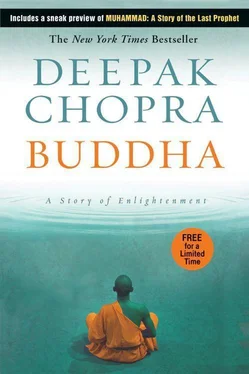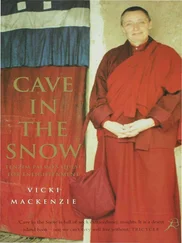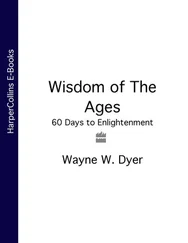“How do they live?” Siddhartha asked.
“Like any other lazybones. I wouldn’t leave meat hanging in my front yard,” said the merchant. “You never know when the gods might want it.”
Siddhartha ignored his cynicism. “Who teaches them?”
“You call it teaching? What are the temples for? Not that the priests are much better, mind you.” Siddhartha pressed the point, and the merchant eventually realized that he wasn’t there simply to reinforce high-caste prejudice. “I’m amazed that you care, Your Highness. From what I can tell, the young ones seek out the older ones. They move around the forest from camp to camp, and the day they arrive at some makeshift school, they bow down before the teacher and ask about the Dharma, whatever his angle happens to be. Dharma? The priests filled us with enough of that.” Dharma could mean many things-a man’s occupation, the rules of proper conduct, a person’s holy duties as outlined by scripture. In this case it was a philosophy, a particular teaching that disciples committed themselves to learn.
“And which Dharma is attracting the most followers?” Siddhartha asked.
The merchant shrugged. “Who can say? The young ones keep wandering. They’re restless and never stay anywhere very long.”
Other travelers that Siddhartha came in contact with were just as hostile. They would have been shocked if they could have penetrated Siddhartha’s defenses and seen what lay behind his hospitable smile. He belonged to the same young, restless breed that disappeared into the forest for years at a time. With each passing day he became more and more aware of his calling. Yet, time was pressing. If he stayed in the palace for just a few more years, the king would be old enough to step aside and bequeath Siddhartha the throne. He couldn’t let that happen. Not love, not family, not his own conscience could force him to betray himself.
And this is what you call being true to yourself?
Gautama’s mind wasn’t convinced. The rain continued to pour from the sky, and the road was so dark that more than once he slipped into the gully on the side. There was no use arguing with his mind, which seemed untamable anyway. Gautama wondered if he was alone among mortals, wanting to abandon all that was good in order to suffer the torment and uncertainty of the wild world. He’d add that to his long list of questions to ask his teacher once he found him. If he found him.
Gautama passed several travelers on the road who could have directed him to one of the forest ashrams where teachers were located. He greeted them humbly, letting them decide to accept his company for a few miles or not; a handful offered him food for his bowl. But he was reluctant to throw himself into the midst of a band of disciples. Gautama wanted to learn, but he didn’t want to give up who he was. His only model for a spiritual teacher was Canki, who had a hidden motive for everything he said.
It wasn’t long before he ran across a wandering monk, a thin, sunburned man who seemed old enough to have had a family with grown children. Gautama expected that the sannyasis he met would be very serious or very eccentric. But this monk, who gave his name as Ganaka, turned out to be cheerful and sociable.
“I’ve been away for twelve years now, lad,” he said as they walked along the road. “You meet all sorts. But now the local people know me, and I’m treated pretty well. Your first holdup’s a shock, though. The dacoits like you to know who’s boss.”
“Do you belong to an ashram?” Gautama asked.
Ganaka shrugged. “I’ve visited them. You get too hungry sometimes.”
“What Dharma do you follow?”
The older monk gave him a look. “Is that what you’re after? I didn’t know you were one of those.” He had nothing more to say for a while, and Gautama wondered with some puzzlement if the word Dharma had offended him. How could you be a monk without a teaching? When he decided to speak again, the older monk said, “Don’t let them fool you.”
“Who?”
“These teachers who promise enlightenment. Listen to the voice of experience. I’m not enlightened, and you won’t be either. They’ll feed you a pack of high-sounding ideas, you’ll work for them year after year, and then when they’ve worn you out, you’ll leave with the taste of ashes in your mouth.”
There was a lot to read in Ganaka’s bitter tone. In a sympathetic voice Gautama said, “Tell me your experience. I want to know.”
Ganaka sighed. “In that case, you’d better have some of my bread. I was going to save it until you were out of sight.” He reached into his shawl and pulled out a large round roti, or flat bread, folded into quarters. He ripped off half for Gautama, but not before blessing it. “I see myself in you,” the older monk began. “I left home after my wife died. I was a vendor of ghee and spices in a village, never rich enough to own a proper store but not poor either.”
“And you were devout?”
“Oh, yes. Raised by a strict father who sent us to the temple for lessons as soon as we could walk. As a child I believed. Even when my dear Bhadda died in so much pain, moaning pitifully for her suffering to end, I believed. I gave away all my earthly possessions, and with the blessing of the priests I set out on my journey.”
“I think you’re still devout,” said Gautama. “You bless your food. Even when no one is watching, I imagine.”
“Habit,” the older monk said curtly. “Anyway, the road is a hard life. I went to visit the forest ashrams, eager as a bridegroom the night after the wedding. I sat at the guru’s feet and waited, mouth open like a gaping fish. That’s why I see myself in you. You want them to drop their wisdom into your gaping mouth. You’re probably a philosopher. No offense, but I can tell by your accent that you never sold rubbish from a stall in the open bazaar.”
“I can’t disagree,” said Gautama diplomatically, caught between smiling at the older monk, who clearly had been dying for someone to talk to, and worrying about the tale of disillusion that was about to unfold.
Ganaka tore off a chunk of roti with his yellow teeth. “They’re shameless, these gurus. The garbage they spew as truth! Do they think we’re fools? They must, as I found out the hard way. I took some of the younger disciples aside and joked with them a bit. Little stuff. Does this guru get paid by the yarn, like a wandering storyteller? Does he think you can feed cows on moonbeams? Next thing I knew, I got thrown out bodily, like I came to steal their shoes. Hypocrisy.” His voice trailed off mournfully as he ran out of spleen. “Moonbeams and hypocrisy.”
“What did you decide to do?”
“I couldn’t go home. I’d given almost everything to the priests, and they don’t give back. But you’ve got some sense, you could see that I’m still devout. I pray, and I have a circuit of householders who feed me and let me take refuge from the storm.”
“Pardon me, but aren’t you simply waiting to die?” asked Gautama.
Ganaka shrugged. “It’s a life.”
Before Gautama could pose another question, they heard a commotion up ahead. A man was screaming curses, a woman was crying. Gautama’s steps quickened, and when he rounded the next curve he saw what the trouble was. A laden bullock cart going to market had run off into the ditch. Several bags of grain had spilled out. A woman was crouched on the ground trying to scoop up the scattered grain with her hands, while over her stood her furious husband.
“Are you an idiot? You’re putting dirt back in the bags. Stop bawling!” he shouted. He began to beat her about the shoulders with his bullock goad.
Gautama came toward them. When he saw a monk, the husband sullenly lowered his stick. “Is your animal hurt?” Gautama asked, noticing that the bullock, which was old and blind in one eye, had fallen onto its front knees.
Читать дальше












